Students can Download 2nd PUC Sanskrit Previous Year Question Paper March 2019, Karnataka 2nd PUC Sanskrit Model Question Papers with Answers help you to revise complete Syllabus and score more marks in your examinations.
Karnataka 2nd PUC Sanskrit Previous Year Question Paper March 2019
अङ्काः 100
समय : 3 घण्टा 15 निमेषाः।
I. एकवाक्येन संस्कृतभाषया उत्तरं लिखत। (10 × 1 = 10)
प्रश्न 1.
विश्वस्य मातरः काः?
उत्तर:
विश्वस्य मातरः सर्वा जगत्पापहराः नद्यः।
प्रश्न 2.
परदुःखेन के अत्यन्तदुःखिनः भवन्ति?
उत्तर:
परदुःखेन साधवोऽत्यन्तदुःखिनः भवन्ति ।
![]()
प्रश्न 3.
माकन्दिका नाम नगरी कुत्र अस्ति?
उत्तर:
जाह्नवीतटे माकन्दिका नाम नगरी अस्ति।
प्रश्न 4.
मृगपोतकस्य नाम किम्?
उत्तर:
मृगपोतकस्य नाम दीर्घापाङ्गः।
प्रश्न 5.
राणाप्रतापस्य अश्वस्य नाम किम्?
उत्तर:
राणाप्रतापस्य अश्वस्य नाम चेतकः इति।
प्रश्न 6.
महाश्वेता के प्रति स्ववृत्तान्तं कथयति?
उत्तर:
महाश्वेता चन्द्रापीडं प्रति स्ववृत्तान्तं कथयति।
प्रश्न 7.
शान्त्याः पत्युः नाम किम्?
उत्तर:
शान्त्याः पत्युः नाम सुन्दरः।
प्रश्न 8.
कः कर्णस्य रक्तं अपिबत्?
उत्तर:
वज्राख्यः कृमिः कर्णस्य रक्तम् अपिबत्।
![]()
प्रश्न 9.
अर्थान् कथं चिन्तयेत्?
उत्तर:
अर्थान् बकवत् चिन्तयेत्।
प्रश्न 10.
कृष्णशास्त्रिणां माता का?
उत्तर:
कृष्णशास्त्रीणां माता श्रीमती शङ्करम्मा।
II. द्वित्रैः वाक्यैः संस्कृतभाषया कन्नडभाषया आङ्ग्लभाषया वा उत्तरं लिखत। (पञ्चानामेव) (5 × 2 = 10)
प्रश्न 11.
भारतवर्षस्य प्रसिद्धपञ्चनदीनां नामानि लिखत।
उत्तर:
गङ्गा, यमुना, सरस्वती, सिन्धुः, चन्द्रभाग आद्याः भारतवर्षस्य प्रसिद्धपश्चनद्यः।

Ganga, Yamuna, Saraswathi, Chandrabhaga and Sindhu are five famous rivers.
प्रश्न 12.
नगरवासिभिः जनैः राक्षसः किम् उक्तः?
उत्तर:
तेन राक्षसेन सम्मुखपतितं यं कमेवं न भक्षितव्यः। जनाः सर्वे तस्मै प्रतिदिनमाहारार्थमेकं मानवं दास्यन्ति इति नगरवासिभिः जनैः राक्षसः उक्तः।

The people of the town told the ogre not to eat anyone who came his way. They told him that they would send one person every day for his food.
प्रश्न 13.
प्रव्राजकः निजान् अनुचरान् किम् उवाच?
उत्तर:
प्रव्राजकः निजान् अनुचरान् गङ्गां गत्वा तत्र अन्तर्वहन्तीं पृष्टंदीपां यां च मञ्जूषां ते पश्यन्ति तां मञ्जूषां गुप्तं तेन साकम् आनेतुम अवदत्। अन्तः ध्वनौ श्रुते अपि सा च न उद्धाटनीया इत्यपि अवदत्।
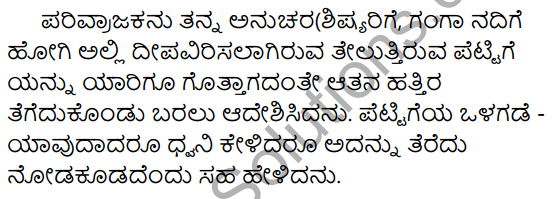
The monk told his pupils to go to the Ganges, and when they see a box floating with a light on top of it, to bring it to him secretly. He warned them not to open the box even if they heard any noise inside.
![]()
प्रश्न 14.
भारतसर्वकारः राणाप्रतापाय कथं गौरवम् असूचयत्?
उत्तर:
महाराणाप्रतापसिंहस्य देशभक्तिः तथा स्वातन्त्र्यसमरे तस्य योगदानस्य स्मरणार्थ भारत गणराज्येन अस्य स्मृतौ मुद्रा, नाण्यकम् प्रकाशितम् वीराधिवीरस्य महाराणाप्रताप सिंहस्य एव आरूढ़चेतक-विग्रहः संसदीय भवनस्य पुरतः संस्थापितः।
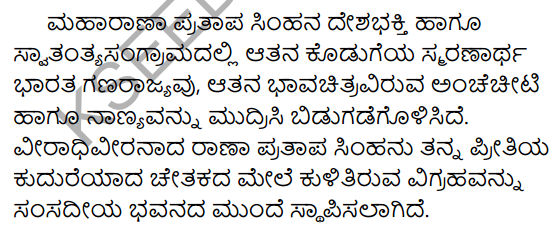
In memory of the patriotism of Maharana Pratap and his contribution to the freedom struggle, the Government of India has issued a postage stamp and a coin. A statue of Maharana Pratap seated on his horse Chetak has been erected in front of Parliament House.
प्रश्न 15.
महाश्वेतायाः वपषि यौवनं कथं पदं कृतम?
उत्तर:
‘अनुरागोदयः’ इति पाठे महाश्वेतायाः यौवनम् एवं वर्णितम् – बाल्यावस्थाम् अतिक्रान्तायाः, महाश्वेतायाः देहे ‘वसन्तकाले मधुमास इब, मधुमास इव नवपल्लवेन, नवपल्लव इव कुसुमेन, कुसुम । इव मधुकरेण, मधुकर इव मदेन, यौवनावस्थाया पदं कृतम्।

The description of the onset of youth in Mahasveta is found in the lesson ‘STORICE:’. As Mahasveta came of age, adolescence bloomed in her body like the ‘madhumasa’ in Vasantha season, like the fresh shoots in madhumasa, of flowers on the new growth, of bees on the flowers.
प्रश्न 16.
वज्राख्यः कीटः किं करोति?
उत्तर:
‘विधिविलखितम्’ इति नाटकभागे ‘वज्रकीटस्य’ चित्रणं वर्तते।
कर्णः शयानस्य गुरोः परशुरामस्य शिरः स्वोत्सङ्गे संस्थापितवान्। तत्समये वज्रकीटः कर्णस्य पीनौ ऊरू स्वचक्षुपुटेन कृन्तन् रक्तं पिबति, मांसं च भक्षयति।
‘विधिविलसितम्’
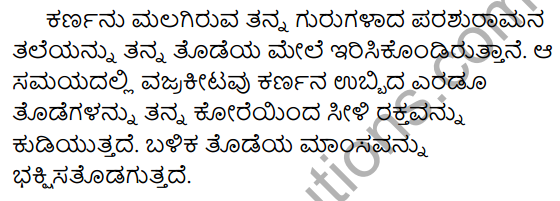
The Vajrakeeta episode occurs in the play fafeldoRTAG’. Karna places the head of his preceptor on his lap to ensure that he has a sound sleep. At that moment, an insect called Vajra begins to bite the thigh of Karna. It starts eating his flesh and drinking his blood.
प्रश्न 17.
शास्त्रिणाम् औदार्यम् ।
उत्तर:
श्री कृष्णशास्त्रीणां संस्कृताभ्यासः बाल्यादेव तत्पितुः सकाशे एव आरभत। सः बाल्ये पित्रा सह पाठशालां गच्छति स्म। संस्कृतश्लोकाः अमरकोषः, पाणिनेः व्याकरणसूत्राणि निरर्गलतया तस्य मुखान्निस्सरन्ति स्म।
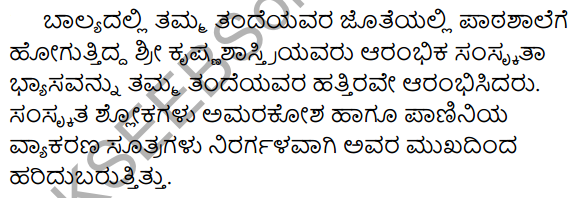
Krishna Sastri learnt Sanskrit from his father from his childhood. He used to go to school with his father. He learnt by heart Samskrita slokas, Amarakosha, and Panini’s grammar.
III. पाठनाम उल्लिख्य श्लोकानाम् अनुवादं कन्नड-आङ्ग्लभाषया वा कुरुत (त्रयाणामेव) (3 x 3 = 9)
प्रश्न 18.
भारतस्यास्य वर्षस्य नवभेदान्निबोधत ।
समुद्रान्तरिता ज्ञेयास्ते त्वगम्याः परस्परम् ।।
उत्तर:
समुद्रस्य यत् उत्तरं, यत् च हिमवद्दक्षिणं, तत् वर्षं भारतं नाम, यत्र इयं प्रजा भारती।

The sub-continent that is to the north of the ocean and to the south of the Himalayas is called Bharata and the people who live here are Bharati (pertaining to Bharata).
![]()
प्रश्न 19.
तदेतां वीक्ष्य दुःखं मे जातं भक्तो हि मे भवान् ।
तेनैवमुक्तवानस्मि त्यक्त्वा मौनं भवत्कृते।।
उत्तर:
एतां वीक्ष्य मे तत् दुःखं जातम्। भवान् मे भक्तो हि। तेन भवत्कृते मौनं त्यक्त्वा एवम् उक्तवान् अस्मि।

“So, when I saw her, I was pained, for you are my devotee; and thus it was on your account that I broke my silence and said what I did.”
प्रश्न 20.
कुतो धार्मक्रियाविघ्नः सतां रक्षितरि त्वयि ।
तमस्तपति धर्मांशौ कथमाविर्भविष्यति ॥
उत्तर:
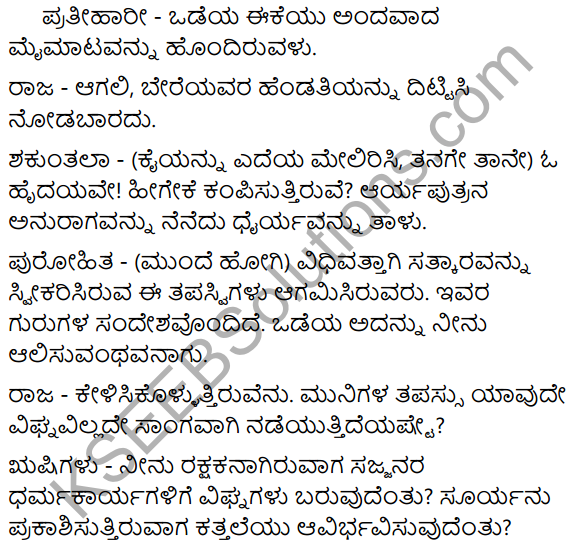
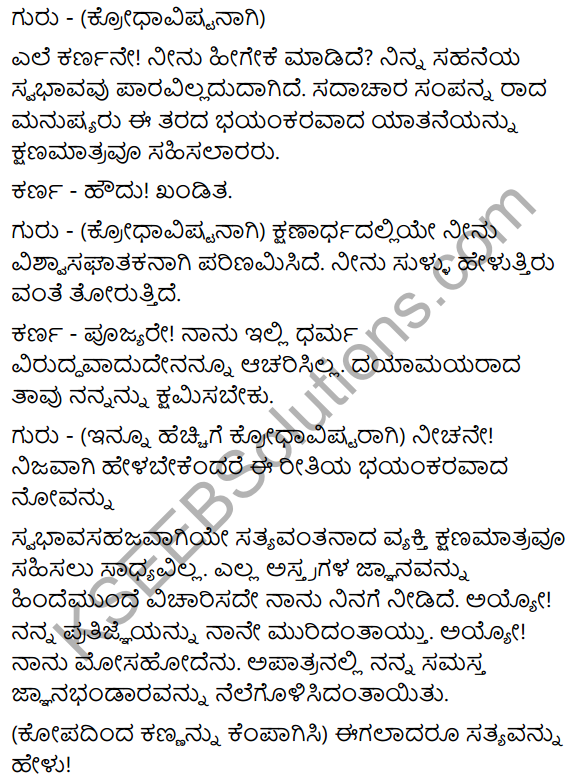
प्रश्न 21.
अस्त्रप्रयोगवेलायां यदा ते सूतभावना।
तदा सर्वाणि चास्त्राणि भवेयुनिष्फलानि हि ॥
उत्तर:
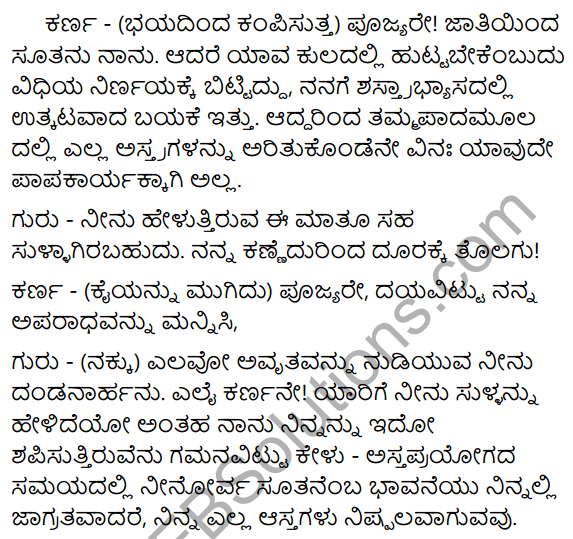
प्रश्न 22.
धनहीनो न हीनश्च धनिकः स सुनिश्चयः।
विद्यारत्नेन यो हीनः स हीनः सर्ववस्तुषु ॥
उत्तर:
धनहीनः न हीनः (धनरहितः न कस्मादपि हीने न भवति) सः धनिकः च सुनिश्चयः। यः विद्यारत्नेन हीनः सः सर्ववस्तुषु हीनः (विद्या विहीनो कनिष्ठः)

A moneyless man is not poor if he has got the riches of learning. A man who has no learning is the poorest, even if he has money.
IV. पाठनाम उल्लिख्य कः कं प्रति अवदत् इति संस्कृतभाषया लिखत (चतुर्णामेव) (4 × 2 = 8)
प्रश्न 23.
त्वं विश्वस्य आर्तिं परिहरसि ।
उत्तर:
इदं वाक्यं ‘परेषामपि रक्ष जीवितम्’ इति पाठात् उद्धृतम्। वाक्यमिदं राक्षसः बकासुरः राजा विक्रमादित्यं प्रति अवदत्।
प्रश्न 24.
भवतु अनिवर्णनीयं परकलत्रम् ।
उत्तर:
इदं वाक्यं ‘शून्या मेऽङ्गुलि’ इति पाठात् उद्धृतम्। वाक्यमिदं राजा दुष्यन्तः प्रतिहरिं प्रति अवदत् ।
प्रश्न 25.
कुत्रापि गत्वा धनं संग्रहिष्यामि ।
उत्तर:
इदं वाक्यं “महाराणाप्रतापः’ इति पाठात् उद्धृतम्। वाक्यमिदं राणाप्रतापः भामशाहं प्रति अवदत् ।
प्रश्न 26.
‘पुण्डरीक इति नाम चक्रे’।
उत्तर:
इदं वाक्यं ‘अनुरागोदयः’ इति पाठात् उद्धृतम् । वाक्यमिदं मुनिबालकः महाश्वेतां प्रति अवदत् ।
![]()
प्रश्न 27.
अहो! भग्नप्रतिज्ञोऽस्मि ।
उत्तर:
इदं वाक्यं ‘विधिविलसितम्’ इति पाठात् उद्धृतम्। वाक्यमिदं कर्णः परशुरामं प्रति अवदत्।
प्रश्न 28.
परीक्षार्थम् इतोऽपि समयावकाशः विद्यते।
उत्तर:
इदं वाक्यं ‘कृष्णशास्त्रीमहोदयः’ इति पाठात् उद्धृतम्। वाक्यमिदं कृष्णशास्त्री महोदयः तस्य छात्रं प्रति अवदत्।
V. दशवाक्यैः संस्कृतभाषया कन्नडभाषया आङ्ग्लभाषया वा उत्तरं लिखत। (पञ्चानामेव) (5 × 5 = 25)
प्रश्न 29.
विक्रमादित्यस्य परोपकारगुणं वर्णयत।
उत्तर:
‘परेषामपि रक्ष जीवितम्’ इति पाठे विक्रमादित्यस्य परदुःखस्पन्दनगुणाः हृदयङ्गमरीत्या निरुपितो वर्तते। एकदा विक्रमादित्यः स्वमन्त्रिषु राज्यभारधुरं निक्षिप्य योगिवेषेण देशं पर्यटितुं गतः। यावत् सः कस्मिंश्चन वनं प्रविशति, तावत् सूर्यः अस्तंगतः। विश्रान्त्यर्थं सः वृक्षमूलमेकम् आश्रितवान्। तस्मिन् वृक्षे निवसतः चिरञ्जीवी नाम्नः पक्षिराजस्य पुत्रस्य वचनेभ्यः पलाशनगरस्य जनाः राक्षसबाधया पीडिताः, पर्यायक्रमेण तस्मै भोजनं पौरैः परिकल्पितं, प्रतिदिनमपि तस्य आहारार्थं मानुष एकः प्रेष्यते; तद्विने पक्षिणः पूर्वजन्मनः मित्रस्य ब्राह्मणस्य पर्यायः इत्यपि जानाति।
परोपकारपरः विक्रमादित्यः तत्क्षणं प्रस्थाय राक्षसं प्रतीक्षमाणः ब्राह्मणस्य परिवारं समाश्वस्य, गृहं सम्प्रेष्य, तन्नगरस्य वध्यशिलाम् आरुह्य उपविशति। तत्रागतः राक्षसः आनन्देन उपविष्टं विक्रमादित्यं दृष्टवा आश्चर्यचकितः भवति। तेन कारणं पृष्टं परार्थं स्वयं प्रेरणया प्राणाः समर्प्यन्ते, अतः दुःखं नानुभवामि इति प्रत्यवदत् राजा।
तस्य परोपकारगुणात् प्रभावितो राक्षसः विक्रमादित्याय वरमेकं प्रदातुंम् इच्छति। विक्रमादित्यः तं राक्षसं ‘नरभक्षणं त्यक्तव्यम्’ इति वरं वृणुते। सर्वेभ्यः प्राणिभ्यः स्वप्राणाः इष्टाः। तदर्थं सर्वेषां प्राणिनां जीवरक्षणं कर्तव्यम् इति तं बोधयति राजा। तेन प्रभावितः राक्षसः ततः प्रभृति जीवमारणं परित्यजति।
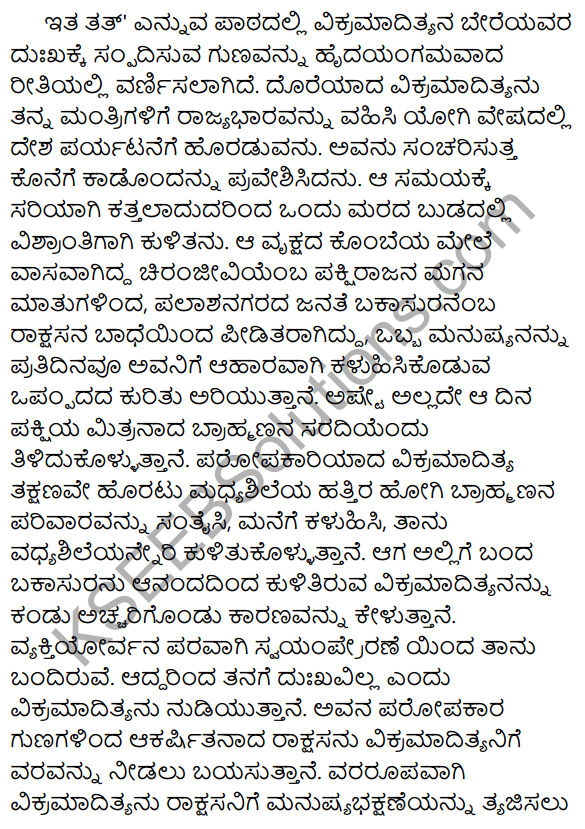

King Vikramaditya’s qualities of magnanimity and doing good to others are described in the lesson ‘PROTATU TA GIACH. Once, placing the burden of government on his ministers, Vikramaditya set out to travel abroad in the guise of a yogi. As he travelled, one evening the sunset while he was in a great forest, and he sat down for shelter under a tree. At the top of the tree lived an aged king of the birds named Chiranjivi. His sons and grandsons would go out every day in the morning to feed themselves and return in the evening. Vikramaditya learnt from their conversation about an ogre in the town of Palasa, that would come every day to the town and devour any man he chanced upon. He also learnt that the people of the town had offered to give the ogre one person every day for food, to which the ogre had agreed. That day it was the turn of a Brahmin. The Brahmin was a friend of one of the sons of Chiranjivi; so the bird was sad.
After listening to the birds, the king went to the town of Palasa. There he saw the Brahmin who had come according to his turn. The king asked the man to leave and he himself sat on the rock. Astonished to see the king sitting smiling on the rock, the ogre asked him the reason for his happiness. The king responded that he was offering himself, of his own accord. He said that the good wish for the happiness of all. They grieve deeply in the grief of others, abandoning their own desires for pleasure and enjoyment. : The ogre was pleased by the king’s conduct and asked him to choose a boon. The king asked him to give up eating humans and advised him to protect the life of others just as he would protect his own. Instructed by the king, the ogre gave up killing creatures from that time.
![]()
प्रश्न 30.
प्रव्राजकः।
उत्तर:
‘निर्विमर्शा हि भीरवः’ इति पाठे चित्रितं प्रमुखं पात्रं परिव्राड् अथवा सन्यासी। एषः गङ्गातटनिवासी मौनव्रती च भवति। भीक्षाटनया जीवनं करोति स्म।
एकदा सः प्रव्राजकः भिक्षार्थमेकस्य वणिजः गृहे गच्छति। तस्य पुत्री या अतीवसुन्दरी आसीत् सा भिक्षां दत्वा अन्तः प्रविशति। तस्या उन्मादकरि रूपं दृष्ट्वा कामवशगः सः शठः येन केन प्रकारेण तां प्राप्तुम् निश्चयति। अथः कपटमेकां युक्तिं चिन्तयित्वा तस्य सुता दुर्लक्षण। यदि तस्याः विवाहो भवति तर्हि वणिजः सकुटुम्बः विनश्यति इति वदति तां कन्यां न्यस्तदीपायां पेटिकायां निक्षिप्य, गङ्गायां क्षेप्तुं परिहारं सूचयति। भीरुः वणिक् परिव्राजा यदुक्तं तत्सर्वं तथैव करोति। अनन्तरं सः परिवाड् स्वशिष्यैः तां पेटिकाम् आनयति। एकान्ते तां पेटिकाम् उद्घाटयति, तदन्ततः घोरः वानरः एकः बहिरागत्य दन्तैः तस्य नासिकां, नखैः कर्णौ च छेदयति। एवं स्वधर्मं प्रामाणिकतया च आचरन् पुरुषः कपटयुक्तिना आत्मनः गौरवं कथं नाशयति, जनैः अपहसितश्च भवति इति पाठेस्मिन् वर्णितम् ।
‘निर्विमर्शा हि भीरवः’
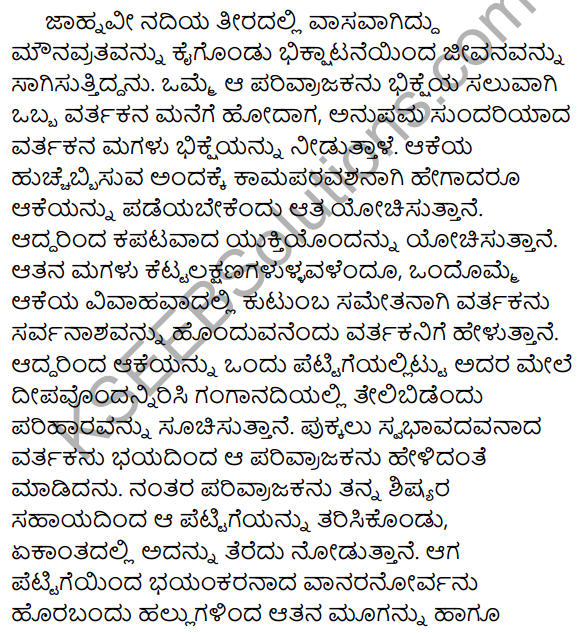
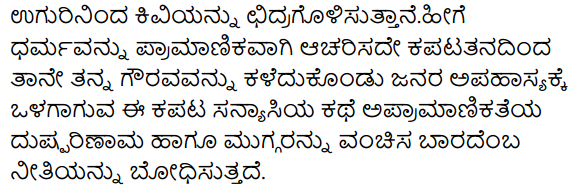
The protagonist of the lesson ”निर्विमर्शा हि भीरवः” is a monk. He lived in a city named Makandika, on the bank of the Ganges. He observed a vow of silence and lived on alms.
Once, when he entered a certain merchant’s house to beg, he saw a beautiful maiden coming out with alms in her hand. The monk, seeing that she was wonderfully beautiful, hatched a plan to get her. He told her father, a merchant, that his daughter had inauspicious marks and that they would all die when she married. Hence he suggested that she be put in a box and be set adrift on the Ganges with a light kept on top of the box.
The timid merchant did not reflect on what the monk had said and agreed to do as the monk had commanded. He put his daughter in a box and set her adrift. The monk asked his pupils to find the box and bring it to him. But even before the monk’s pupils could get to the box, a prince chanced upon the box and replaced the girl in the box with a monkey. After the prince departed, the monk’s pupils came there in the course of their search, found the box, and carried it to the monk. When the monk opened the box, a monkey sprang out, and in its fury tore off the nose of the wicked monk with its teeth and his ears with its claws. The next morning everyone who heard the story had a hearty laugh.
प्रश्न 31.
दीर्घापाङ्गप्रसङ्गः।
उत्तर:
‘दीर्घापाङ्गप्रसङ्गः’ महाकवि कालिदासेन विरचितं ‘अभिज्ञान शाकुन्तलम्’ इति रुपकस्य पञ्चमाङ्के चित्रितं विद्यते।
दुर्वासशापाद्राजा दुष्यन्तः शकुन्तलां न स्मारयति। तदा सा अभिज्ञानेन तस्याशङ्कामपनेतुं प्रयतते। किन्तु अङ्गुलीयकशून्यामङ्गुलिं दृष्ट्वा विशण्णमानसा तस्मै मृगपोतकः दीर्घापाङ्गस्य व्रत्तान्तं वर्णयति।
एकस्मिन् दिवसे नवमालिकामण्डपे नलिनीपत्रभाजनगतमुदकं राजा दुष्यन्तस्य हस्ते सन्निहितमासीत्। तत्क्षणे शकुन्तलयाः पुत्रकृतको पिपासार्दितः दीर्घापाङ्गो नाम मृगपोतकः तत्र आगच्छति। तदा दुष्यन्तः ‘अयं तावत्प्रथमं पिबत्वित्यनुकम्पिनो तम् उदकं ददाति। तस्यापरिचयात् ‘सः मृगपोतकः तस्यान्तिके नागच्छति। यथा शकुन्तला तदेव उदकं स्वहस्ते ग्रह्णाति तदा सः मृगपोतकः तस्याः हस्ते सन्निहितं जलं पिबति। इदं दृष्ट्वा दुष्यन्तः ‘सर्वः सगन्धेषु विश्वसीति। शकुन्तला मृगपोतकौ च अरण्यकौ’ इति प्रहसति।
‘दीर्घापाङ्गप्रसङ्गः’
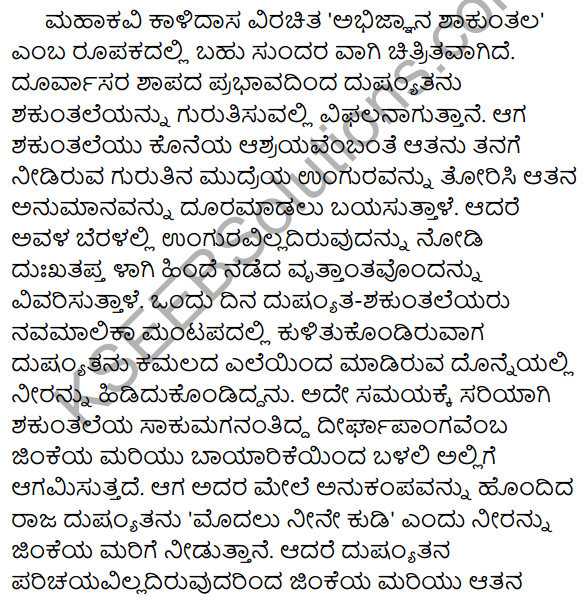
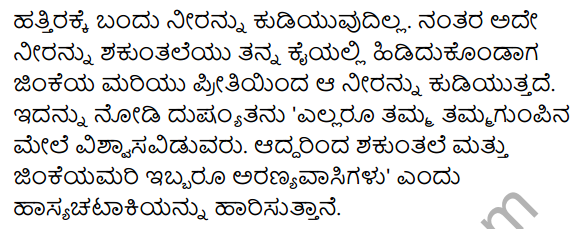
‘दीर्घापाङ्गप्रसङ्गः’ occurs in the play ‘3rfallergara’ written by the famous poet Kalidasa.
King Dushyanta fails to recognise Sakuntala because of the curse of the sage Durvasa. Even Sakuntala fails to rouse his curse-swept memory. As a last resort, she wants to show him his signet ring which he had given her after marriage. As ill luck would have it, it had slipped off her fingers during the journey. Sakuntala still has confidence in her heart and so she narrates an incident of the past.
One day while sitting in the Jasmine bower, king Dushyanta had in his hand water in a cup of lotus-leaves. Just at that moment the little fawn, Dirghapanga by name, who was the adopted son of Sakuntala, arrived there. King Dushyanta, taking pity on him, said “Let him drink first”; he was coaxed to drink the water; but not being familiar with the king, he did not come close to his hand. He, however, liked the same water, when afterwards it was taken by Sakuntala in her hand. Then Dushyanta had said in jest, “One puts faith in one’s kindred; both of you here are foresters”.
![]()
प्रश्न 32.
महाराणाप्रतापेन अनुभूता कष्टपरम्परा।
उत्तर:
यदा महाराणाप्रतापः अरण्ये वसतिस्म तदा तस्य परिवारः महत्कष्टम् अनुबभूव। एकत्र सर्वदा वैर्याक्रमणशङ्का, अन्यत्र आहाराभावात् पुत्रकलत्राणां कष्टपरम्परा च अतीववेदनाकरी बभूव । एकस्मिन् दिने राणाप्रतापस्य पत्नी अरण्यतृणबीजचूर्णेन रोटिकाः सज्जीकृत्य सर्वेभ्यः किञ्चित्-किञ्चि द्भागं दत्तवती स्वपुत्र्यै अपि रोटिकां दत्वा ‘तस्याः अर्धमेव खादित्वा अवशिष्टमधु परेधुः भक्षणार्थं रक्ष इति उक्तवती। स्वप्रियदुहितुः परेधुः आहारः लप्स्यते वा न वा इति शङ्कया प्रेममयी माता तथावोचत् । एतादृशं दारुणं कारुण्यपूर्णश्च जीवनं व्यतीयाय सर्वोऽपि परिवारः। बहुभ्यः दिनेभ्यः पर्याप्ताहाराभावात् क्षुधिता बालिका तदानीमेव रोटिकां खादितुम् आरेभे। तावति काले कुतश्चित् अकस्मादागतः कश्चन अरण्यमार्जालः बालिकायाः हस्तात् रोटिकामाकृष्य कुत्रचिदधावत्। बालिका महता दुःखेन आक्रन्दितुम् उपचक्रमे। एतत्करुणापूर्णदृश्यम् अवलोक्य कठोरहृदयस्य राणाप्रतापस्यापि मनः अद्रवत्।
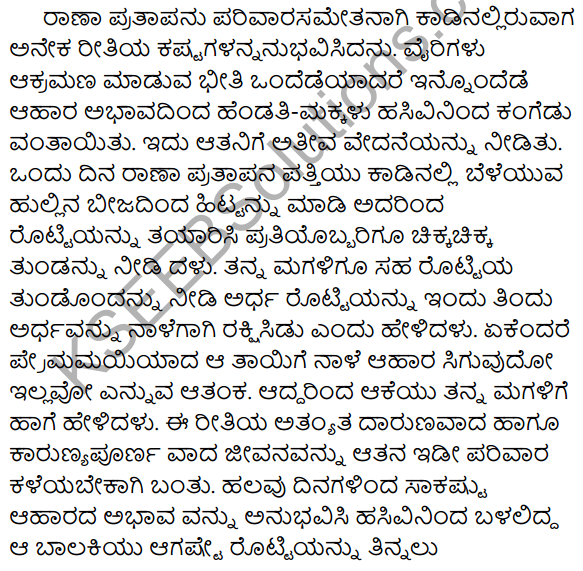
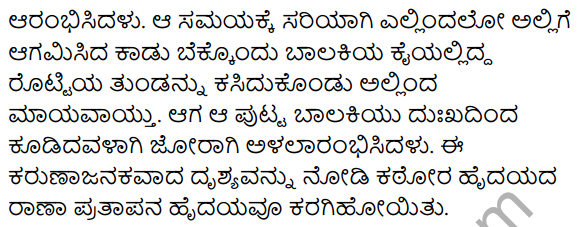
Rana Pratap’s family faced a lot of difficulties when it stayed in the forest. On the one hand, he was bothered by the attack of the enemies and on the other by the difficulties faced by his wife and children due to shortage of food. One day his wife prepared Rotis from the powder of the seeds of hay in the forest and served small pieces of rotis to the family members. She instructed her daughter to eat only half of the roti served to her and keep the other half for the next day as she doubted the availability of food the next day. His family members were leading such a pathetic life. As the daughter had not eaten food for many days, she started eating the roti given to her. Just then a wild cat snatched the roti from her hand and ran away. Rana Pratap’s heart melted on seeing this heart-rending scene.
प्रश्न 33.
पुण्डरीकस्य जन्मवृत्तान्तं लिखत।
उत्तर:
पुण्डरीकस्य जन्मवृत्तान्तः ‘अनुरागोदयः’ इति पाठे वर्णितं विद्यते।
पुरा दिव्यलोकनिवासी श्वेतकेतुर्नाम महामुनिः आसीत्। तस्य च भगवतः अशेषत्रिभुवनसुन्दरं रुपमासीत्। स कदाचित् देवतार्चन कमलानि उद्धर्तुं, मन्दाकिनीमवततार। तं तदा देवी लक्ष्मी ददर्श। आलोकतमात्रेण समासादित-सुखायां क्रमेण तस्मिन्नेवासनीक्रते पुण्डरीके कुमारः समुदपदि। ततस्तमुत्सङ्गेनादाय – ‘भगवन्! गृह्यतां तवायमात्मजः’ इत्युकत्वा श्वेतकेतवे ददौ । पुण्डरीकसम्भवतया तस्य तदेव पुण्डरीक इति नाम चक्रे।
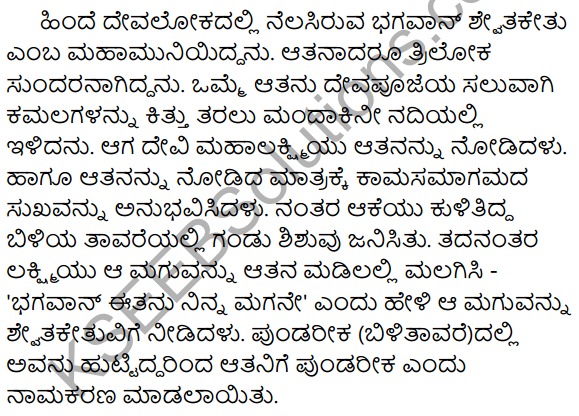
The episode of the birth of Pundarika is narrated in the lesson ‘अनुरागोदयः’. There lived in the world of devas a great ascetic named Svetaketu, of sublime austerities, whose fame had spread to all the three worlds, and who was held in great reverence by all the celestials. When young he was extraordinarily handsome; both the deva and asura women delighted in his beauty. Once, this ascetic entered the white waters of the Mandakini to gather lotus flowers for worship. Seated as usual on the white lotus of a thousand petals amidst the forest of lotuses, was the goddess Lakshmi who saw the handsome young ascetic entering the water.
As she looked at him she fell in love with him. She rested her languid face on her hand and gave herself up to her lust for him. Her desire was satisfied right there seated on the thousand-petalled white lotus merely by gazing at him. A son was born to her right then and there. She picked him up from her lap and brought him over to Svetaketu and said, “Accept this child, your son”. Svetaketu accepted the child and performed all the rites prescribed for infants and named him Pundarika, as he was born on a white lotus.
प्रश्न 34.
सा शान्तिः ।
उत्तर:
‘सा शान्तिः’ इति कथायाः मूललेखकः डा ॥ शिवरामकृष्णन् महोदयः। कथेयं संस्कृतभाषया अनूदिता कीर्तिशेषेण डा॥ एस्. रामकृष्णराव महोदेयेन।।
यथा नाम्नैव सूचितं कथायाः नायिका शान्तिः इति। सा विंशतिके वयसि वर्तमाना नवतरुणी। सा सर्वलक्षणसम्पन्ना सर्वावयवसुन्दरी च आसीत् अनिवार्यतया जीवननिर्वाहणार्थं सा एकस्मिन् वस्त्रापणे कार्यं करोति स्म। तस्य वस्त्रापणस्य समीपे एव तरुणस्यैकस्य कार्यालयम् आसीत्। अस्याः सौन्दर्येण आकृष्टः सः स्वमनसि एव तां प्रति विविधाभिः भावनाभिः सदा तामेव अचिन्तयत्। एकदा शान्ति तस्य कार्यालयं गत्वा मृतस्य स्वपतेः वार्षिकश्राद्धे भागं वोढुं प्रार्थयति। एतस्याः सुसंस्कृतं सद्वर्तनं तरुणस्य मनः परिवर्तयति। समाजे स्त्रियः गौरवपूर्णतया द्रष्टव्याः इति सन्देशः अनेन पाठेन लभ्यते।
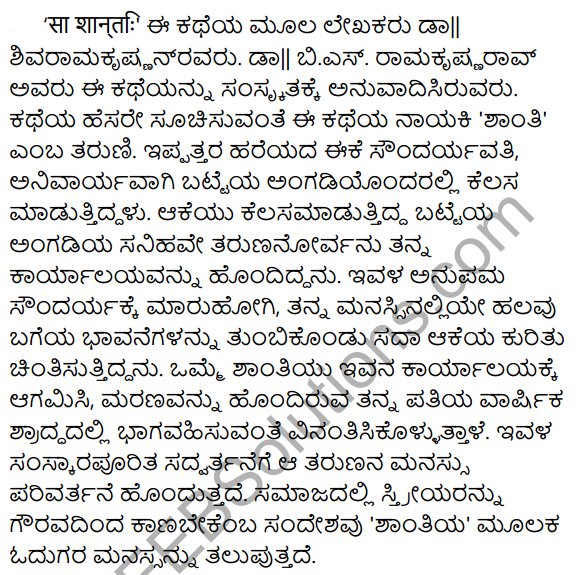
‘सा शान्तिः’ is a story originally written in English by Dr. Shivarama Krishnan. It was translated into Sanskrit by Dr. B.S. Ramakrishna Rao.
The heroine of the story is a young lady called ‘Shanthi’. She was very beautiful and was in her twenties. Owing to circumstances she was working in a cloth shop. A young man had his office close to that shop. Enraptured by her beauty, he thought about her a lot. Once, Shanthi goes to his office and requested him to attend the annual ceremony of her dead husband. With her cultured behavior, he felt bad about his own mean thoughts towards her. From that moment onwards, he changed his own perception totally. The message of the story ‘सा शान्तिः’ is to suggest to every one that one should respect women in this society.
![]()
प्रश्न 35.
कर्ण – परशुरामयोः संवादः।
उत्तर:
‘कर्णः-परशुरामयोः संवादः’ विधिविलसितम् इति पाठे वर्तते।
कर्णः गुरोः परशुरामात् शस्त्रविद्याम् अभ्यस्तुमिच्छति। कर्णस्य गुरुभक्त्या सन्तुष्टः परशुरामः तस्मै सर्वाणि शस्त्राणि उपदिशति। तदनन्तरम् उपवासादिव्रतदीक्षाम् आचरितुं कथयति । व्रतदीक्षानन्तरं भार्गवास्त्रम् उपदिशति।
कर्णः स्वविद्याभ्यासस्य परिसमाप्तेरनन्तरं गुरवे दक्षिणां दातुमिच्छति। निर्लिप्तस्य वनवासिने स्वस्मै गुरुदक्षिणायाः आवश्यकता नास्ति। तथापि गुरुदक्षिणा दत्ता चेत् कलासहिताः सर्वाः विद्याः सफलाःइत्याशिषा तमभिनन्द्य गुरुकुलात् बहिर्गन्तुम् अनुमतिं ददाति।
गुरुकुलस्य वैभवं पश्यन् कर्णः भूमौ शयानं गुरुं पश्यति। तस्य शिरः स्वोत्सङ्गे स्थापयति। वज्रकीटप्रसङ्गेन उत्थितः गुरुः परशुरामः क्रोधाविष्टः सन् कर्णं भर्त्सयति – ‘पुनः किमर्थम् आश्रमं प्रत्यागतवान्? कथमहं भवतः उत्सङ्गे शयनमकरवम्? अस्याः रक्तधारायाः कारणं किम्? इदृशीष् असामान्यां सहनां वहन् त्वं कः?’ इति।
तदा कर्णः – ‘अहं सूतपुत्रः। अस्त्रविद्यायाः आकाङ्क्षया भवतः सकाशम् आगतवान्। न कयापि दुर्मत्या’ इति तस्य क्षमा याचते। अनेन कुपितो भूत्वा गुरुः ‘यदा ते मनसि सूतभावना जायते तदा अभ्यस्ताः सर्वा विद्याः विस्मरन्तु’ इति शपति। कर्णपरशुरामयोः संवादः न कदापि असत्यं वदेत् इति नीतिं बोधयति, कर्णस्य करुणां परिस्थिति दृष्ट्वा सन्तापं सूचयतः तस्य परशुरामस्य शिष्यवात्सल्यमपि व्यक्तं भवति।
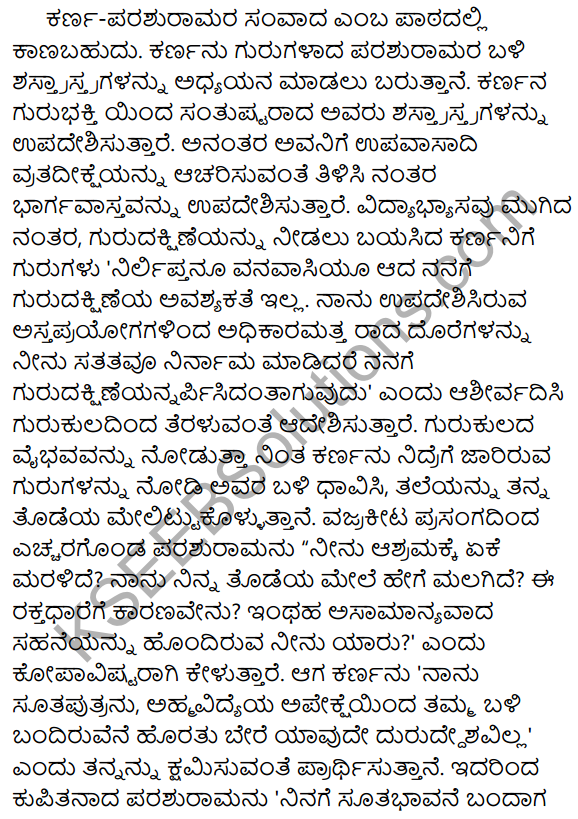
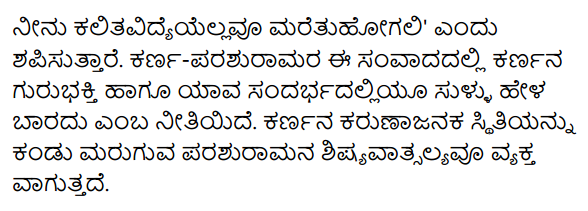
The conversation between Karna and his preceptor Parashurama is taken from the lesson PateCRIGH, an extract from the drama ”कर्णः-परशुरामयोः संवादः” by Dr. K.S. Nagarajan.
Karna approaches Parashurama to acquire the knowledge of weapons and missiles. Parashurama, pleased with Karna’s devotion, teaches him all that he knows about weapons. After initiating him into the various austerities, he teaches him the secret of the Bhargavaastra. After completing his education, Karna desires to give guru Dakshina to his preceptor. But the preceptor says that he has no need for any fee as he is a recluse living in the forest. If you kill all the arrogant kings with the art of missiles taught by me to you, that itself is the fees you may pay me.
Having taken leave of his preceptor, Karna gives a longing look at the hermitage with which he was associated for so long. Suddenly he sees his preceptor who is in deep sleep. He goes near and takes his head in his lap and ensures that the preceptor sleeps soundly. At that moment, an insect called Vajra begins to bite the thigh of Karna. It starts eating his flesh and drinking his blood. The touch of warm blood awakens Parashurama and he asks Karna, “Whose blood is this? How come my head is on your lap? Why did you come back to the ashram? Tell me the truth”.
Karna replies with all humility, “Master, I am the son of a charioteer. I had a very ardent wish to gain knowledge of weapons. That is why I came to you and learnt from you. I have no other motive. Please pardon me if I have committed any wrong”. Infuriated by the knowledge that Karna is a charioteer’s son, Parashurama curses him thus – “The moment you remember that you are the son of a charioteer, may you forget all that you have learnt from me”. Karna falls at his feet and begs his pardon. Parashurama blesses him.
This conversation between Karna and Parashurama, while highlighting Karna’s devotion towards his preceptor, cautions people against uttering lies under any circumstance. Parashurama, taking pity on Karna, shows his affection for his disciple.
प्रश्न 36.
शास्त्रिणाम् शिष्यवात्सल्यम् ।
उत्तर:
शास्त्रीमहोदयानां शिष्यवत्सल्यम् ‘कृष्णशास्त्रीमहोदयः’ इति पाठे वर्णितम्।
कृष्णशास्त्रीमहोदयस्य शिष्यवात्सल्यम् अनुपमम् आसीत्। तस्य शिष्येषु एकतमः डा॥ के.एम्. कृष्णराव् महोदयः कुत्रचित् घटनामिमां वर्णयति – “तस्य सहपाठी एकः आर्थिकतया क्लिष्टं परिस्थितिम् अनुभवति स्म। परिक्षार्थं धनं पूरयितुम् असाध्यमिति परीक्षागमनमेव मास्तु इति निश्चित्य सः कालेज् आगमनमेव स्थगितवान्। पञ्चषानि दिनान्यवलोक्य कृष्णशास्त्रीमहोदयः तद्धिद्यार्थिनः आर्थिकसमस्यां विदित्वा, ‘स यत्र कुत्रापि भवतु, कालेज् आनेतव्य एव’ इति कृष्णराव् महोदयं समादिष्टवान्। आगते च तस्मिन् परिक्षार्थं कियद्धनं पूरयितव्यमिति विचार्य तदर्थं स्वस्यैव ‘चेक’ दत्वा परीक्षां स्वीकर्तुं साहाय्यम् अकरोत् । ‘ऋणरूपेण स्वीकरोतु, धनं सम्पाद्य तदनन्तरं प्रतिददातु’ इति समाश्वास्य तत्सङ्कोचं दूरमकरोत्। ‘परिक्षार्थम् इतोऽपि समयावकाशः विद्यते सम्यक् अध्ययनं कर्तव्यम्’ इति वक्तुं न व्यस्मरत् सः”।
राष्ट्रकविः कुवेम्पु महोदयोऽपि एषां शिष्य आसीत्। सः यदा बेगलूरु नगरात मैसूरनगरं गच्छति स्म, तदा कुवेम्प महोदयेन सह निरपवादतया मिलति स्म ‘यदा मैसूरु नगरं गच्छति तदा स्वशिष्यः कुवेम्पु न दृष्टश्चेत् देवतादर्शनं विना देवालयात् प्रत्यागमनमिव’ इति तस्य भावना आसीत्।
कुवेम्पु महाशयस्य प्रतिभा प्रथमे वयस्येव प्रत्यभिज्ञाय तं ‘वरकविः’ इति सम्बोधितवान् । आनन्दवर्धनस्य ‘ध्वन्यालोकं’ कन्नड-भाषया अनूदितुं महदौत्सुक्यमासीत् एतेषु। कृतेरस्याः अनुवादकार्य स्वशिष्येण डा के. कृष्णमूर्तिमहाभागेन स्वीकृतमिति विदित्वा, ससन्तोषं तमेव प्रोत्साहितवान् प्रास्ताविकवचनानि अलिखच्च।
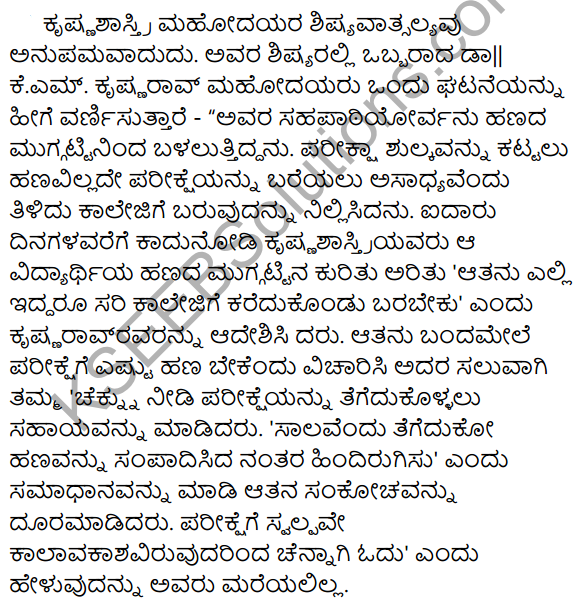
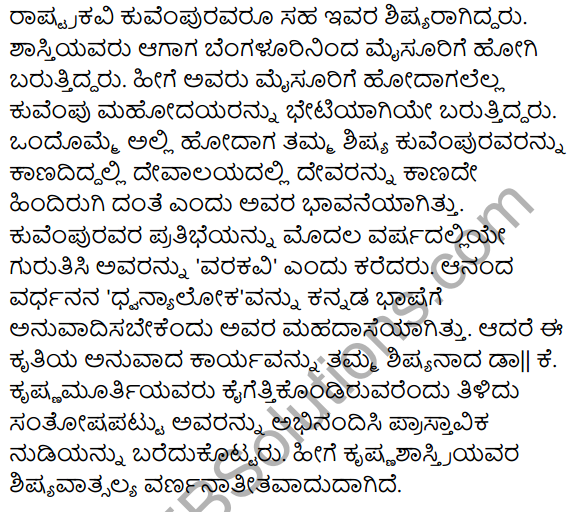
Krishna Sastri’s love for his students is described in the lesson ‘‘कृष्णशास्त्रीमहोदयः”.
Krishna Sastri’s love for his students was unparalleled. He would help them in whatever way he could and encourage them to study. Once, one of Sastri’s students was in financial difficulties and could not pay the examination fee. Hence he stopped coming to college. When Sastri came to know about this, he instructed one of his students, K.M. Krishna Rao, to go and bring the student. When the student arrived, Sastri gave him a cheque and asked him to pay the examination fee and attend college. This incident shows his love for his students.
![]()
Rashtrakavi Kuvempu was his student. Whenever Sastri went to Mysore he made it a point to meet Kuvempu. During any of his visits, if he could not meet Kuvempu, he considered it akin to returning from a temple without seeing god.
When Kuvempu was his student, Sastri recognized his talent and addressed him as ‘Varakavi’. Sastri wanted to translate Anandavardhan’s ‘Dhvanyaloka’ into Kannada. But when he came to know that one of his students, Dr K. Krishnamurthy had already taken up the translation of the book, he not only encouraged him but also wrote the foreword to the book.
Thus his love for his students was inexplicable.
VI. मञ्जूषातः सूक्तं पदं चित्वा रिक्तस्थानं पूरयत। (4 × 1 = 4)
सर्वावयवसुन्दरी, नराः, योगेन, सैन्यं। ।
प्रश्न 37.
द्वीपेषु सर्वेषु ………….. प्रयान्ति ।
उत्तर:
नराः
प्रश्न 38.
वैरिणां ………. समुद्रोपमं आसीत् ।
उत्तर:
सैन्यं
![]()
प्रश्न 39.
संक्षेपतश्चेत् स्मर्तव्या ……….. |
उत्तर:
सर्वावयवसुन्दरी
प्रश्न 40.
विद्या ………. रक्ष्यते।
उत्तर:
योगेन
VII. संयोजयत (4 × 1 = 4)
प्रश्न 41.
क – ख
(a) गन्धवहः – (i) ऋषिकुमारकः
(b) पुण्डरीकः – (ii) वृक्षः
(c) गोविन्दः – (iii) वायुः
(d) पुष्पितः – (iv) बहपत्यः
उत्तरः
a – iii; b – i; c – iv; d – ii.
VII. रेखाङ्कितानि पदानि अश्रित्य प्रश्ननिर्माणं कुरुत। (त्रयाणमेव) (3 × 1 = 3)
प्रश्न 42.
पुत्थलिका भोजराजं प्रति अब्रवीत् ।
उत्तर:
पुत्थलिका के प्रति अब्रवीत्?
प्रश्न 43.
परिव्राट् मौनं त्यक्त्वा उक्तवान् ।
उत्तर:
परिव्राट् किं त्यक्त्वा उक्तवान्?
प्रश्न 44.
उद्योगाः अस्मत् प्रतीक्षायां न तिष्ठति।
उत्तर:
के अस्मत् प्रतीक्षायां न तिष्ठन्ति?
प्रश्न 45.
कविकुलगुरुंः कालिदासः।
उत्तर:
कविकुलगुरुः कः?
प्रश्न 46.
विमर्शकेन कृतीनामध्ययनं सम्यक् कर्तव्यम् ।
उत्तर:
केन कृतीनामध्ययनं सम्यक् कर्तव्यम्?
IX. यथानिर्देशं कुरुत। (चतुर्णामेव) (4 × 3 = 12)
प्रश्न 47.
सन्धिं विभजत/योजयत। (त्रयाणामेव)
द्वीपोऽयम्, विषयामिषम्, तथा + एव, यत् + अहम्, मम + ऊरुद्वयम् ।
उत्तरंः
द्वीपोऽयम् = द्विपो + अयम्।
विषयामिषम् = विषय + आमिषम् ।
तथा + एव = तथैव ।
यत् + अहम् = यदहम्।
मम + ऊरुद्वयम् = ममोरुद्वयम् ।
![]()
प्रश्न 48.
विग्रहवाक्यं/समस्तपदं लिखत। (त्रयाणामेव)
इन्द्रद्वीपः, वस्त्रापणः, भार्गवस्य अस्त्रम्, नराः एव विग्रहाः, गुरोः उपदेशः।
उत्तरंः
इन्द्रद्वीपः = इन्द्र इति द्वीपः।
वस्त्रापणः = वस्त्रस्य आपणः।
भार्गवस्य अस्त्रम् = भार्गवास्वंम् ।
नराः एव विग्रहाः = नरविग्रहाः।
गुरोः उपदेशः = गुरुपदेशः।
प्रश्न 49.
लिङ्ग-विभक्ति-वचनानि लिखत। (द्वयोरेव)
महाशयस्य, विद्या, मया, सलिलम् ।
उत्तरंः
महाशयस्य = पुंलिङ्गः, षष्ठीविभक्तिः, एकवचनम् ।
विद्या = स्त्रीलिङ्गः, प्रथमाविभक्तिः, एकवचनम् ।
मया = अस्मद् शब्द, तृतीयाविभक्तिः , एकवचनम् ।
सलिलम् = नपुंसक लिङ्गः, प्रथमाविभक्तिः, एकवचनम् ।
प्रश्न 50.
लकार-पुरुष-वचनानि लिखत। (द्वयोरेव)
अब्रवीत्, धारयन्ति, निबोधत, मन्यते।
उत्तरंः
अब्रवीत् = लङ्लकारः, प्रथमपुरुषः, एकवचनम् ।
धारयन्ति = लट्लकारः, प्रथमपुरुषः, बहुवचनम्।
निबोधत = विधिलिङ्लकारः, प्रथमपुरुषः, बहुवचनम् ।
मन्यते = लट्लकारः, प्रथमपुरुषः, एकवचनम्।
प्रश्न 51.
पदपरिचयं कुरुत। (त्रयाणामेव)
कृत्वा, निरीक्ष्य, प्रवेशयितुम्, अध्येतव्यः।
उत्तरंः
कृत्वा = त्वान्ताव्ययम्।
निरीक्ष्य = ल्यबन्ताव्ययम् ।
प्रवेशयितुम् = तुमुन्नन्ताव्ययम्।
अध्येतव्यः = विद्यर्थकः तव्यत्प्रत्ययः।
![]()
प्रश्न 52.
प्रयोगं परिवर्तयत।
सः पत्रिकाम् आरब्धवान् ।
उत्तरंः
तेन पत्रिका आरब्धा।
अथवा
विक्रमादित्यः कालं नयति।
उत्तरंः
विक्रमादित्येन कालो नीयते।
प्रश्न 53.
अलङ्कारं सलक्षणं निर्दिशत।
‘अस्याः आननारविन्दे अपूर्वाकर्षणम् आसीत्।’
उत्तरंः
अत्र रुपकालङ्कारः वर्तते।
तल्लक्षणम् – ‘उपमानोपमेययोरभेदः रुपकम्’।
अथवा
“मध्ये तपोधनानां किसलयमिव पाण्डुपत्राणाम्।”
उत्तरंः
अत्र उपमालङ्कारः वर्तते।
तल्लक्षणम् – ‘उपमायत्रसादृश्यलक्ष्मीरुल्लसति द्वयोः’।
प्रश्न 54.
कन्नडभाषया-आङ्ग्लभाषया वा अनुवदत। [5]
क्रीडा मानवस्य नितराम् आवश्यकी। क्रीडया शक्तिः वर्धते। उल्लासः उत्पद्यते। आरोग्य जायते। मनः विकसति। जीवनोत्साहः एधते। एकताभावः सम्पद्यते। मैत्री विस्तारं गच्छति, अतः खलु ज्येष्ठाः एक घण्टापर्यन्तं तुल्यशीलवयोभिः क्रीडितव्यमिति उपदिशन्ति।
उत्तर:
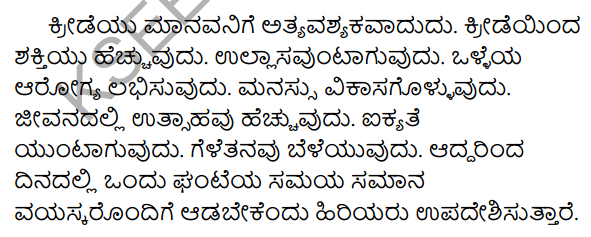
Sports are a very important aspect of life. Sports boost our physical strength. We get motivated. Health improves. The mind is refreshed. They create zeal in life. They develop in us the spirit of oneness. They develop a sense of friendliness. That is why elders recommend that we should engage in some sport with people of the same age group.
प्रश्न 55.
संस्कृतभाषया अनुवदत। [5]
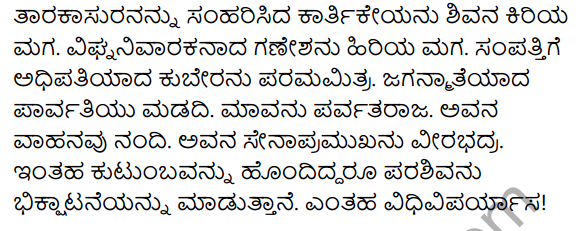
Kartikeya, the destroyer of demon Taraka, is the younger son of Lord Shiva. Ganesha, the remover of obstacles, is His elder son. Kubera, the lord of wealth, is His friend. Parvathi, the mother of the Universe, is His wife. Parvatharaja, the king of mountains, is His father in-law. Nandi is His vehicle. Virabhadra is His chief of army. In spite of all this Lord Shiva begs. What a destiny!
उत्तर:
कार्तिकेयः यो तारकासुरम् अहन्यत् सः शिवस्य कनिष्ठः पुत्रः। विघ्नविनाशकः गणेशः तस्य ज्येष्ठः पुत्रः। सम्पदः अधिपतिः कुबेरः तस्य परमसखा। जगन्माता पार्वती भार्या। पर्वतराजा खशुरः। नन्दि तस्य वाहनम्। वीरभद्रः तस्य सेना प्रमुखः। एतादृश परिवारे सति परशिवः भिक्षाटनं
![]()
प्रश्न 56.
इमं परिच्छेदं पठित्वा प्रश्नानाम् उत्तराणि लिखत। (5 × 1 = 5)
पुरा देवशर्मा नाम विद्वान् एकः आसीत्। तस्य पुत्रः मल्लिनाथः। बाल्यादपि तस्य पठने आसक्तिः न – आसीत्। सः यदा युवकः भवति तदा तस्य विवाहः समभूत्। श्वशुरगृहगमनानन्तरं विद्यावन्तः तस्य श्यालाः तम् अपहसितवन्तः। तदा सः स्वदोषं ज्ञात्वा काशीं गत्वा गुरोः सकाशे विद्याभ्यासम् अकरोत्। एष एव कालिदासादि कवीनां ग्रन्थानां व्याख्यानकर्ता मल्लिनाथः अद्यापि विद्वांसः मल्लिनाथं बहू – आदरेण पश्यन्ति ।
प्रश्नाः
(i) देवशर्मणः पुत्रः कः?
(ii) मल्लिनाथस्य कदा विवाहः समभूत्?
(iii) मल्लिनाथः कस्य सकाशे विद्याभ्यासम् अकरोत्?
(iv) कालिदासादि कवीनां ग्रन्थानां व्याख्यानकर्ता कः?
(v) अद्यापि विद्वांसः कं बहु – आदरेण पश्यन्ति?
उत्तरं:
(i) देवशर्मणः पुत्रः मल्लिनाथः।
(ii) मल्लिनाथः यदा युवकः भवति तदा तस्य विवाहः अभवत् ।
(iii) मल्लिनाथः गुरोः सकशे विद्याभ्यासम् अकरोत् ।
(iv) कालिदासादि कवीनां ग्रन्थानां व्याख्यानकर्ता मल्लिनाथः।
(v) अद्यापि विद्वांसः मल्लिनाथं बहु आदरेण पश्यन्ति।
अथवा
पुस्तकप्रकाशकं प्रति पुस्तकप्रेषणाय आवेदनपत्रं लिखत ।
उत्तरं:
सकाशात्
सुहास् हेच.
10, तृतीयामुख्यमार्गः, जयनगरम्
मैसूरु।
सविधे,
वेदान्तभारती
बनशङ्करी
बेङ्गलूरु।
विषयः पुस्तकप्रेषणाय आवेदनम् ।
भवत्प्रकाशितस्य ‘प्रबन्धसङ्ग्रहः’ नामक पुस्तकस्य विषये अहं ज्ञातवान् । तत् पुस्तकं मया अवश्यं क्रेतव्यम्। अतः तत्पुस्तकं वि.पि.पि. द्वारा शीघ्रं प्रेषयतु इति विनयेन प्रार्थये ।
धन्यवादाः।
भवदीयः
सुहासः
स्थलम् : मैसूरु
दिनाङ्क : १० जनवरि २०१९.